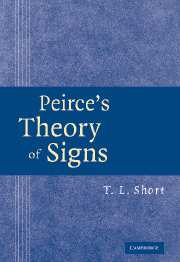Book contents
- Frontmatter
- Contents
- Preface
- Acknowledgments
- 1 Antecedents and Alternatives
- 2 The Development of Peirce's Semeiotic
- 3 Phaneroscopy
- 4 A Preface to Final Causation
- 5 Final Causation
- 6 Significance
- 7 Objects and Interpretants
- 8 A Taxonomy of Signs
- 9 More Taxa
- 10 How Symbols Grow
- 11 Semeiosis and the Mental
- 12 The Structure of Objectivity
- Bibliography
- Name Index
- Subject Index
- Frontmatter
- Contents
- Preface
- Acknowledgments
- 1 Antecedents and Alternatives
- 2 The Development of Peirce's Semeiotic
- 3 Phaneroscopy
- 4 A Preface to Final Causation
- 5 Final Causation
- 6 Significance
- 7 Objects and Interpretants
- 8 A Taxonomy of Signs
- 9 More Taxa
- 10 How Symbols Grow
- 11 Semeiosis and the Mental
- 12 The Structure of Objectivity
- Bibliography
- Name Index
- Subject Index
Summary
Does teleology have a future? On the one hand, final causation would seem to be excluded by modern science. On the other hand, there is Peirce's contrary view. Peirce's scattered remarks of various dates, taken together, suggest (a) that types of outcome play an explanatory role in some sciences and (b) that this is the key to making final causation intelligible. In the first four sections, we develop thesis (a), in the remaining three, thesis (b).
Explanation in Statistical Mechanics
Peirce appears to have been inspired by two innovations in nineteenth-century science: the molecular/kinetic theory of gases and heat and Darwin's theory of natural selection. As early as 1877, he wrote,
Mr. Darwin proposed to apply the statistical method to biology. The same thing had been done in a widely different branch of science, the theory of gases. Though unable to say what the movements of any particular molecule of a gas would be …, Clausius and Maxwell were yet able, by the application of the doctrine of probabilities, to predict that in the long run such and such a proportion of the molecules would, under given circumstances, acquire such and such velocities. … In like manner, Darwin, while unable to say what the operation of variation and natural selection in any individual case will be, demonstrated that in the long run they will adapt animals to their circumstances.
(W3:244)Notice that two things are being claimed about each of these sciences.
- Type
- Chapter
- Information
- Peirce's Theory of Signs , pp. 117 - 150Publisher: Cambridge University PressPrint publication year: 2007



